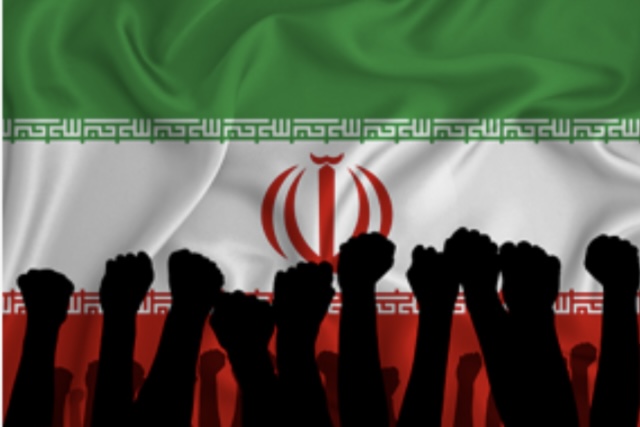Protests in Iran: Thousands Charged in Tehran For Involvement in Anti-Government Demonstrations
December 2, 2022
On Sunday, November 13th, an anonymous individual received the first death sentence from the court in Tehran, Iran’s capital city. Additionally, numerous unnamed individuals received prison sentences on the same day, contributing to the thousands of Iranians charged for their involvement in protests throughout all 31 of the country’s provinces. The unrest within Iran was sparked by the death of 22-year-old Mahsa Amini at the hands of authority figures for not complying with the nation’s strict dress codes for women (having to wear loose clothing and a head covering). Since the incident in early September, the protests from Iranian citizens have continued into November, fighting for women’s rights, as well as standing up to the Iranian government’s strict censorship throughout the country and their violation of human rights when responding to the protestors, whom are often deemed to be rioters.
Regarding the court’s prosecution of protestors on the 13th, the individual was sentenced to execution by the judiciary because their offenses consisting of “setting fire to a government centre, disturbing public order and collusion for committing crimes against national security,” along with “moharebeh” (waging war against God) and “corruption on Earth” (Aljazeerah). Those given prison sentences received anywhere from 5 to 10 years, under charges relating to, or violating, national security (Aljazeerah). These are only a few of the estimated thousands that have been given sentences in Tehran only, due to involvement in protests (Aljazeerah).
Public courts related to the protests began in October, due to leaders of Iran’s political establishments wanting ‘fast-track’ courts to punish those involved in protests, which could also deter future ‘riots’. Despite the degree of charges that protestors have been subject to by Iranian authorities, cases such as the sentences of November 13th are still preliminary, meaning they aren’t finalized until they are approved by an appeals court.
As the political unrest has continued into its third month, many people have compared the ongoing issues to Iran’s “Bloody November,” which had its three-year-anniversary about a week ago. This incident occurred in 2019 from November 15th to 19th, in which Iran’s citizens expressed their discontent with the government when gas prices suddenly tripled. Similar to the restricted internet access imposed on Iran in the present, the “Bloody November” incident included a week-long shutdown of internet access while protests and violence spread across Iran.
Another recent development within Iran involves Supreme Leader Ayatollah Ali Khamenei, who traveled to Zahedan (around Iran’s southeastern Sistan and Baluchesten provinces) to investigate events of “Bloody Friday.” This event was on September 30th 2022, in which 66 citizens were killed by live ammunition (including children), according to Amnesty International (Aljazeerah). Iranian authorities stated that the deaths were a result of terrorists that opened fire on a police station and that security forces arrived in response. However, this account was contested by the Sunni Friday prayer leader of Zahedan, Abdolhamid Ismaeelzahi, who stated that the security forces were responsible for the deaths. Furthermore, he reaffirmed this claim in a meeting with the Supreme Leader of Iran on November 13th, according to the state-run Islamic Republican News Agency.
Along with the recent actions taken by Iranian authorities within their country, there have been developments in foreign involvement with Iran’s political unrest, and members of the UN have been working towards supporting women’s rights in Iran, as well as taking action to show their disapproval of Iran’s authorities’ actions in response to protests. For example, the US, European Union, United Kingdom, and Canada all levied human rights sanctions on Tehran, which responded with sanctions of their own in return. Josep Borrell, the bloc’s foreign policy chief, explains that “another package of sanctions against the people responsible for the repression of the demonstrators [is being worked on]” (Aljazeerah).
On the other hand, Iran authorities continue to insist that the West, specifically the United States and their eastern ally Israel, are behind the political unrest within Iran. On the topic of intervention in Iranian domestic affairs, Iran’s representative in the UN, Khadijeh Karimi, says that Western countries “lack[ed] the moral credibility to preach” and that “Reducing the common cause of human rights to a tool for political purposes of specific groups of Western countries is appalling and disgraceful” (BBC). A similar sentiment was shared by China’s ambassador, Chen Xu, who warned against “turning human rights into a tool to intervene into other countries’ internal affairs” (BBC).
Despite differing opinions between nations, the UN Human Rights Council voted on the establishment of an investigation into the Iranian government’s crackdown on demonstrations and protests within their country, with 25 states in favor, 6 against, and 16 abstaining ( BBC). German Foreign Minister Annalena Baerbock explains the need to take action in light of the restrictions the Iranian government placed on its citizens, saying, “If we don’t collect the evidence today, if we don’t support this resolution, justice will never come to the victims” (BBC).



